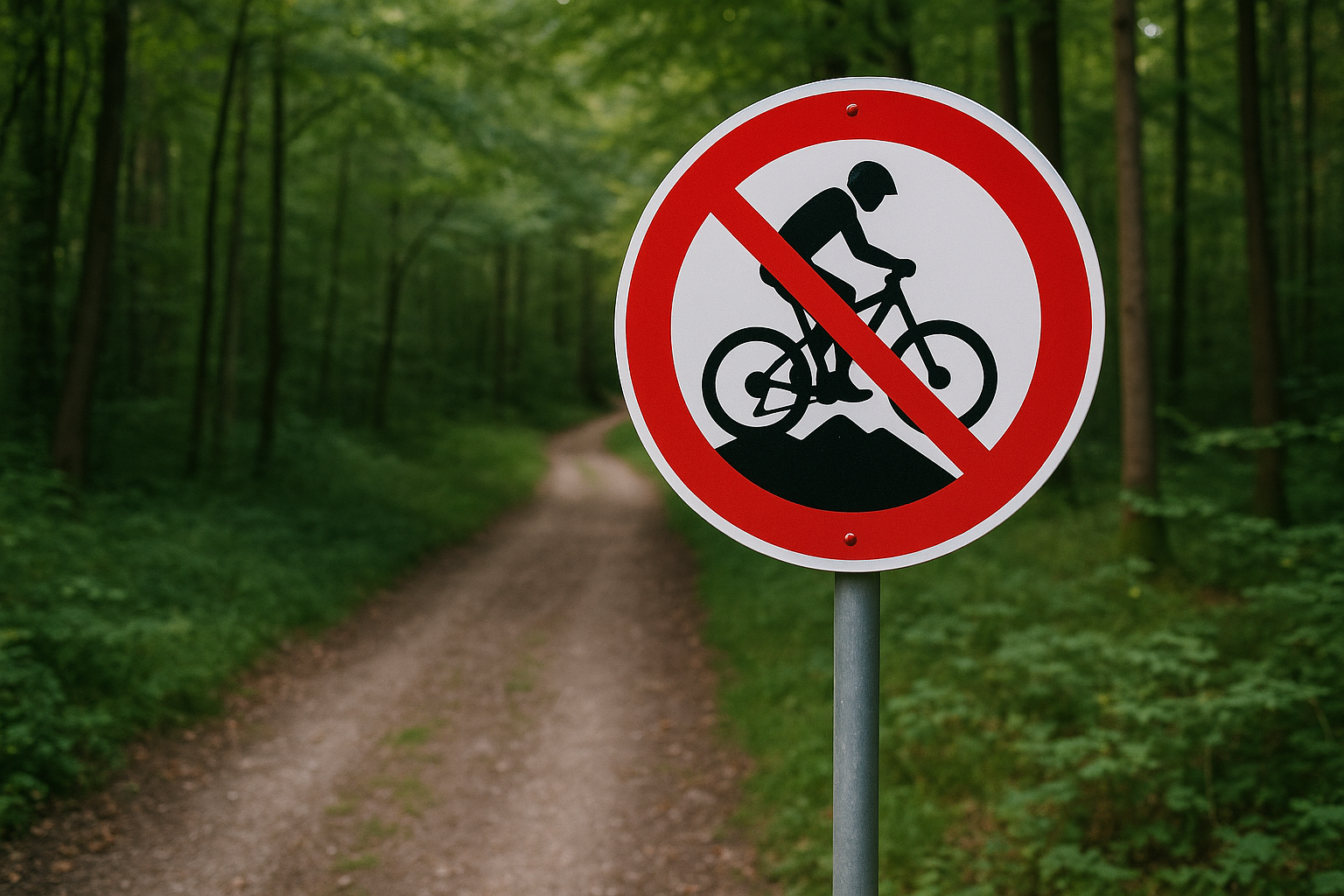Imagine you’re a mountain biker. Not one of those pseudo-athletes in neon-green discount gear, but someone with real grip, a bike that costs more than a small car, and a craving for freedom. You hit the pedals, the forest calls. But barely have you gained speed, when yet another sign appears: „Cycling prohibited!“
Welcome to the German-speaking world.
Austria: The Middle Ages Are Alive and Well
Let’s start with the land of emperors, cheese-filled dumplings, and Kafkaesque laws: Austria. Here, Section 33 of the Forestry Act reigns supreme — from 1975. Yes, you read that right. 1975! Back when flared pants were in, people smoked on trains, and the fax machine was considered cutting-edge tech.
And from that era comes this rule: You may only cycle in the forest if the landowner agrees. Since 82% of Austrian forests are privately owned, that effectively means: Prohibited!
Totally absurd. You can hike, jog, even ride horses — but dare show up with two wheels and a smile, and you’re suddenly a public threat.
The scene is pushing back. A citizens‘ initiative for free trail access is gaining traction, and change is in the air. But for now, mountain biking in Austria remains legally suspect.
Germany: Much Ado About Two Meters
Cross the border into Germany, and things look better at first glance. According to federal law, cycling on forest roads and trails is allowed. Sounds reasonable, right?
Then you hit Baden-Württemberg. Land of obsessive cleanliness and Swabian perfectionism. Here, the infamous two-meter rule applies: If a trail is narrower than two meters, cycling is forbidden. Period.
The idea? Protect nature and avoid collisions. The reality? A patchwork of bans, rarely enforced, and above all: Unrealistic. Anyone who’s ever talked to a hiker knows: Conflicts don’t come from path width but from a lack of courtesy — on both sides.
Most other states never introduced this rule. Bavaria? No problem. Brandenburg? Ride freely. Only Baden-Württemberg clings stubbornly to a paragraph that belongs in a legal museum.
Switzerland: Cantonal Chaos on Two Wheels
Then there’s Switzerland. Ah, the Alps, the cheese, the punctuality. Here, riding in forests is generally allowed. Mostly. Except in Zug. Or Appenzell. Or maybe Graubünden. Depends which canton you’re in.
Because in Switzerland, the rule is: What isn’t explicitly forbidden is allowed. But if a canton sees it differently, suddenly it’s „Trail closed, merci.“ The result? A maze of local regulations that can make even a GPS cry.
But unlike Austria, Switzerland is more pragmatic. Many MTB routes are well-marked, there’s cooperation with tourism boards, and progress is being made toward broader legalization.
The Vision: Trails for Everyone (Who Can Behave)
Why is this all so complicated? Because forests aren’t no man’s land. They belong to someone. They’re for recreation, industry, and conservation. Fair enough. But that’s exactly why we need a unified, modern, and workable solution.
What if the bike associations of Germany, Austria, and Switzerland joined forces? A DACH Trail Code, defining the rights and responsibilities of mountain bikers. Setting standards, promoting trail building, and reducing conflict.
The foundations are already there: DIMB, IMBA Europe, Swiss Cycling, BikePro — all could be part of a cross-border trail initiative. With digital maps, certified trails, and a shared code of conduct.
Time to End the Patchwork
Mountain biking is not a crime. It’s passion, motion, connection to nature. What we need isn’t more prohibition — it’s understanding. Among bikers, landowners, hikers, and politicians.
Because in the end, we all want the same thing: To get out into nature and into life. Without reading a new restriction sign every 500 meters.


No responses yet